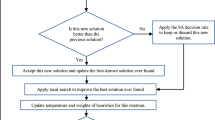Abstract
One of the first problems to be studied in scheduling theory was the problem of minimizing the makespan in a two-machine flow shop. Johnson showed that this problem can be solved in O(n log n) time. A crucial assumption here is that the time needed to move a job from the first to the second machine is negligible. If this is not the case and if this ‘delay’ is not equal for all jobs, then the problem becomes NP-hard in the strong sense. We show that this is even the case if all processing times are equal to one. As a consequence, we show strong NP-hardness of a number of similar problems, including a severely restricted version of the Numerical 3-Dimensional Matching problem.
Similar content being viewed by others
REFERENCES
Coster, M. J., Private communication, 1993.
Dell'Amico, M., “Shop problems with two machines and time lags,” Operations Research, 44, 777–787 (1996).
Dell'Amico, M. and R. J. M. Vaessens, “Flow and open shop scheduling on two machines with transportation times and machine-independent processing times is NP-hard,” Materiali di discussione 141, Dipartimento di Economia Politica, Universit`a di Modena, 1996.
Garey, M. R. and D. S. Johnson, Computers and Intractability: A Guide to the Theory of NP-Completeness. Freeman, San Francisco, 1979.
Graham, R. L., E. L. Lawler, J. K. Lenstra, and A. H. G. Rinnooy Kan, Optimization and approximation in deterministic sequencing and scheduling: A survey. Annals of Discrete Mathematics, 5, 287–326 (1979).
Hoogeveen, J. A., J. K. Lenstra, and S. L. van de Velde, “Sequencing and scheduling,” inM. Dell'Amico, F. Maffioli, and S. Martello (eds.), Annotated Bibliographies in Combinatorial Optimization, Wiley, Chichester, 1997, Ch. 12.
Johnson, S. M., “Optimal two-and three-stage production schedules with setup times included,” Naval Research Logistics Quarterly, 1, 61–68 (1954).
Johnson, S. M., “Discussion: Sequencing njobs on two machines with arbitrary time-lags.” Management Science, 5, 299–303 (1958).
Kern, W. and W. M. Nawijn, “Scheduling multi-operation jobs with time lags on a single machine,” in U. Faigle and C. Hoede (eds.), Proceedings 2nd Twente Workshop on Graphs and Combinatorial Optimization, Enschede, 1991.
Lenstra, J. K. Private communication, 1991.
Mitten, L. G., “Sequencing njobs on two machines with arbitrary time-lags,” Management Science, 5, 293–298 (1958).
Orman, A. J. and C. N. Potts, “On the complexity of coupled-task scheduling,” Discrete Applied Mathematics, 72, 141–154 (1997).
Yu, W., The Two-Machine Flow Shop Problem with Delays and the One-Machine Total Tardiness Problem, PhD Thesis, Department of Mathematics and Computer Science, Technische Universiteit Eindhoven, 1996.
Author information
Authors and Affiliations
Corresponding author
Rights and permissions
About this article
Cite this article
Yu, W., Hoogeveen, H. & Lenstra, J.K. Minimizing Makespan in a Two-Machine Flow Shop with Delays and Unit-Time Operations is NP-Hard. Journal of Scheduling 7, 333–348 (2004). https://doi.org/10.1023/B:JOSH.0000036858.59787.c2
Issue Date:
DOI: https://doi.org/10.1023/B:JOSH.0000036858.59787.c2




